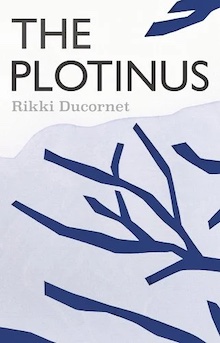
Coffee House Press, 2023
In the dystopian world of Rikki Ducornet’s The Plotinus, every human being who can afford to relocate to Mars has done so, leaving the poor to “inherit the earth (such as it is).” The oppressions formerly meted out by governmental systems—policing and incarceration—are now the domain of the Plotinus, a fierce robot whose goal is the extinction of sentient life.
The narrator, a young man, lives alone in a cell. He has been arrested for leaving his house holding a knobby walking stick—an object that aligns him with a group that once resisted the Plotinus’s tyranny by communing with, and revering, the natural world. A single beam of light penetrates an air vent that he can reach on tiptoe, and he delivers his tale by rapping his knuckles, in code, against the vent. He is visited by the Vector, a cleric who gives him a honeycomb, a second sack (to cover his nakedness), a laurel twig, and a pair of socks “programmed to dissolve at the break of light.”
Whether the Vector and his gifts actually exist is unclear, for The Plotinus is not only an examination of the effects of isolation, but also an exploration of resistance, and in his denuded world, the imprisoned narrator’s most powerful weapons are his creativity and ingenuity—the same imagination he uses to construct his encoded narrative.
Throughout, he shares memories of his beloved as well as of their resistance group, a collective that gathered with knobby sticks each day before dawn, trekked into the woods (such as they were), climbed trees, and watched the sun rise. They also maintained a secret cemetery in which they reverently buried birds, whose numbers were rapidly dwindling: “Sometimes a bird would fall alone; other times an entire flock would rain down from the sky. Nonetheless, the Beauty and I would give each its own place to rest, each resting place marked by a stone.”
Struggling under the weight of loneliness, at times the prisoner considers “turning to stone”—code, presumably, for ceasing to be sentient. But he never takes this possibility too seriously, as the tiniest flash of life—a sunbeam, a honey crumb, a hornet’s sting, a laurel twig—revives his fantasy machine: “If I had a twig, I said, a small twig sporting maybe a leaf or two, well then, a moment’s dreaming and it would contain all the splendors, the raptures, and the mysteries of the world.”
The Plotinus’s most memorable character is a hornet who enters the prisoner’s cell and stings him. “I noticed,” he says, “that her body was striped with amber, and that her eyes were the color of blue apothecary bottle glass. A cobalt blue threaded with gold.” He observes that “[h]er face is elegant. She has what was once called a frimousse, meaning an irresistible, somewhat feline look.” The hornet’s face reminds him at once of his beloved and of the attractions of sentience: “My beloved’s face was like this; she, too, had a frimousse, and I could not help but find myself deeply taken with this tiny creature that is—as I am still—sentient.”
Once this hornet—real or imagined—enters his tale, the prisoner gives up the notion of turning to stone. And when Smaragdos, as he christens her, shows up with a swarm of her fellows, and the hornets set about constructing a tri-storied nest in a high corner of his cell, the narrator is both electrified and rejuvenated: “I cannot help but entertain the childish fantasy of making myself so small as to enter the hive’s diminutive portal, perhaps even renting an apartment, one with a view of a public park, an orchard or a garden.”
By the novella’s end, the Plotinus that arrested our narrator has broken down and been replaced by a Novel Plotinus, and the Vector, chafed by the prisoner’s philosophical musings and obsession with beauty, has been replaced by a more tolerant Vectoress. But the prisoner—beaten, starved, imprisoned, isolated, abandoned—not only abides; he looks forward to what may come.
Perfect for this moment in which artistic output is being increasingly threatened by mechanization, The Plotinus is a hilarious, heartbreaking, and ultimately hopeful testament to the power of creative vision. The figure of the prisoner, disarmingly cheerful and charmingly unreliable, is a stand-in for each of us, not to mention a reminder of what truly unites us, and can ultimately save us—our ability to dream.
+++
Rikki Ducornet is a transdisciplinary artist. Her work is animated by an interest in nature, Eros, tyranny, and the transcendent capacities of the creative imagination. She is a poet, fiction writer, essayist, and artist, and her fiction has been translated into fifteen languages. Her art has been exhibited internationally, most recently with Amnesty International’s traveling exhibit I Welcome, focused on the refugee crisis. She has received numerous fellowships and awards including an Arts and Letters Award from the American Academy of Arts and Letters, the Charles Flint Kellogg Award in Arts and Letters from Bard College, the Prix Guerlain, and the Lannan Literary Award for Fiction. Her novel The Jade Cabinet was a finalist for the National Book Critics Circle Award. She lives in Port Townsend, Washington.
+
Jen Fawkes is the author of Mannequin and Wife (LSU Press), a 2020 Shirley Jackson Award Nominee, and Tales the Devil Told Me (Press 53), finalist for the 2022 World Fantasy Award for Single-Author Story Collection. Locus has called her work “witty and dark, extravagant and savage,” and according to Library Journal, she is “a writer to watch.” Her fiction has won numerous prizes, including the 2021 Porter Fund Literary Prize, and has appeared in One Story, The Iowa Review, Lit Hub, The Offing, Crazyhorse, Best Small Fictions, and many others. Her debut novel, Daughters of Chaos, is forthcoming in 2024 from Abrams Books.